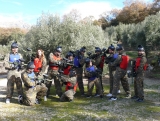Buying Equipment in Physical Shops or Online?
It largely depends on how convenient each option is for you. If you have enough knowledge to not need advice (though it's always recommended), it's generally more convenient to buy through a specialised climbing gear website; but it's equally advisable to visit a shop and exchange opinions with a specialist in these sports.
As with everything, it depends on how much of a perfectionist or "particular" you are. If you're looking for very specific items like stainless steel screws with plastic caps to prevent oxidation or oversized carabiners, it's highly recommended to visit a trusted retailer and assess in person whether it's the right gear for you.

This doesn't mean the best option is to go to an industrial hardware shop (or even a local one) as this is a controversial topic in climbing. This is due to the certifications required for such equipment - while it's understood that materials built to withstand weights like iron beams or concrete won't break with a person's weight, climbing gear must be certified according to load and break tests, making them different.
Are They Certified Materials?
Materials used for mountain sports must be adapted to weather conditions and wear factors, meaning abrasion, friction with rock, moisture... Therefore, they need a specific composition beyond certifications and standards, ensuring you have safe equipment - which is what truly matters.If you ask any mountain sports technician specialising in these activities, they'll tell you that going to a non-specialised shop is completely wrong. Not because it won't guarantee safety, but because you'll end up with reliable yet much heavier equipment than climbing-specific gear.

It's true that less specific climbing equipment can be found in almost any sports shop or online retailer, especially if you don't need to carefully assess the item and know exactly what you want (brand, model, intended use...). You might find discounts, but in "smaller shops", if you don't mind spending slightly more, they'll advise you on all available options for your practice.
For example, if you want to buy a rope or know if it needs replacing after a few years, a physical shop can best assist you by answering all your questions and helping determine the perfect thickness for your needs. A well-maintained rope - not left on the ground (sand acts like tiny blades on the fibres) and without many falls - might not need replacing after 3 years, but experts would advise you accordingly.
Continuing this example, they'd advise on rope diameter. For climbing, ropes between 10-12mm maximum are recommended as they offer an excellent balance between dynamic performance, number of factor 2 falls they can withstand, weight, durability and handling. A thicker rope becomes unwieldy like ship rigging, while a thinner one lasts less time and requires (or recommends) an experienced climber for belaying or rappelling.
Do You Know the Best Brands?
Beal is among the best brands. Their ropes are the most dynamic with excellent weight. Plus, their waterproofing system is outstanding. They're worth the higher price. Another option is Edelrid ropes, offering great value - less dynamic but very durable. In any case, always opt for a 70-metre rope.Another essential climbing item is an assisted braking belay device. The GriGri remains one of the best-selling and most recognised worldwide, but alternatives include Edelrid's Eddy (which twists the rope less) and Faders' Sum.
Most importantly, ensure your rope works smoothly with both carabiners and cinch devices. Ultimately, everything depends on the experience you gain through practice and the techniques you adopt.

In short, the options are simple. Buy from traditional retailers where you might get list price discounts through club/federation membership or personal connections; or purchase climbing gear from large stores or online shops offering such aggressive discounts (sometimes up to 20% off) they're hard to refuse.
We propose another foolproof alternative: climb and get advice from the best. In Spain, you'll find numerous options for this. Just click here to discover all possibilities for rock climbing and indoor climbing in our country. Companies specialising in these sports always employ technical experts who are undoubtedly the best source for learning and getting advice.











